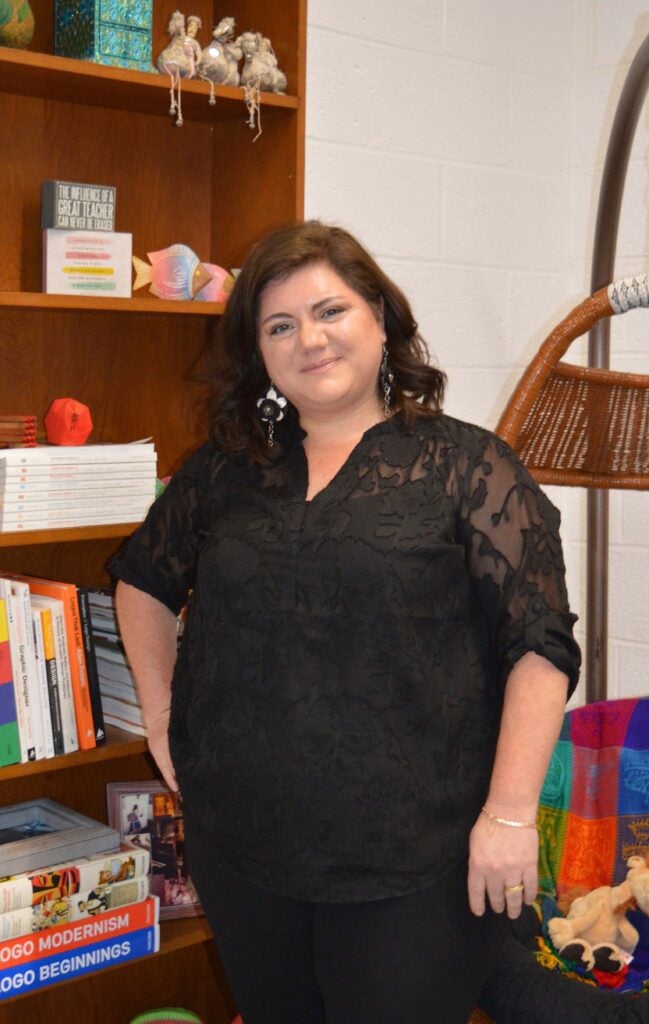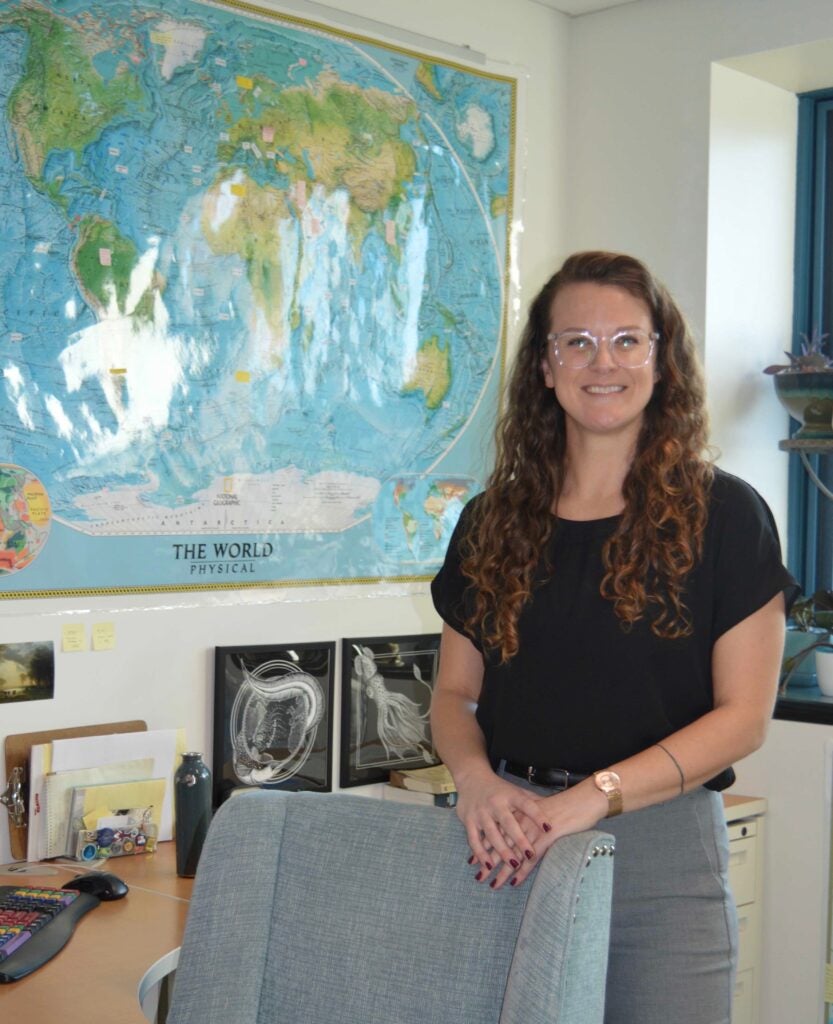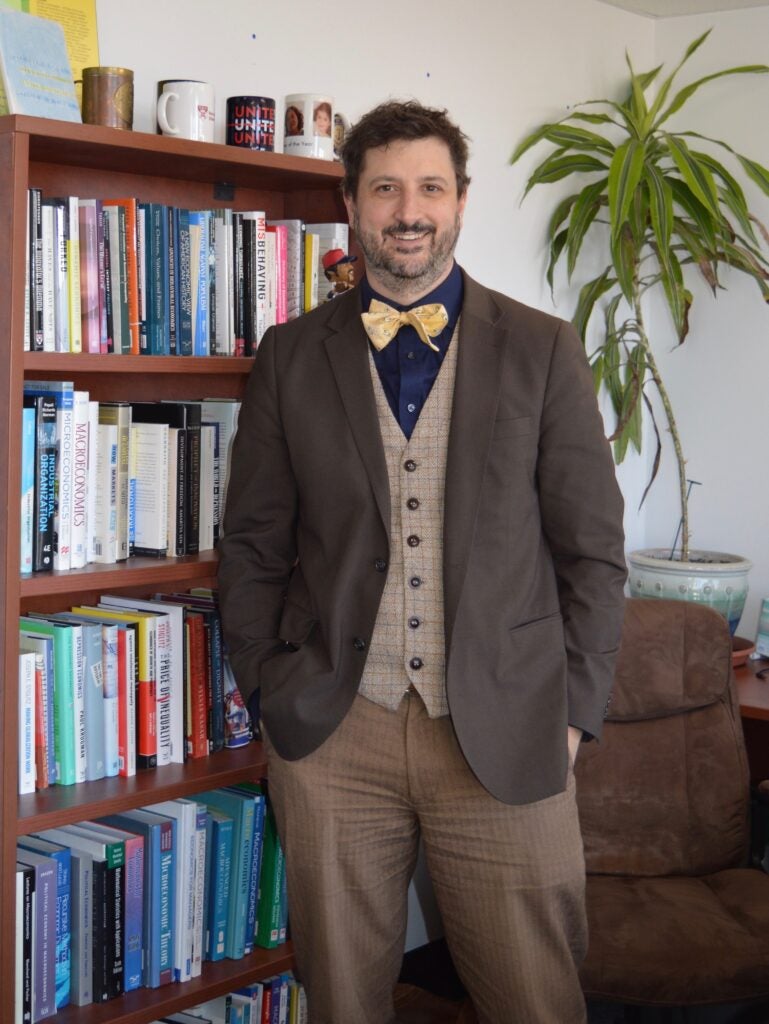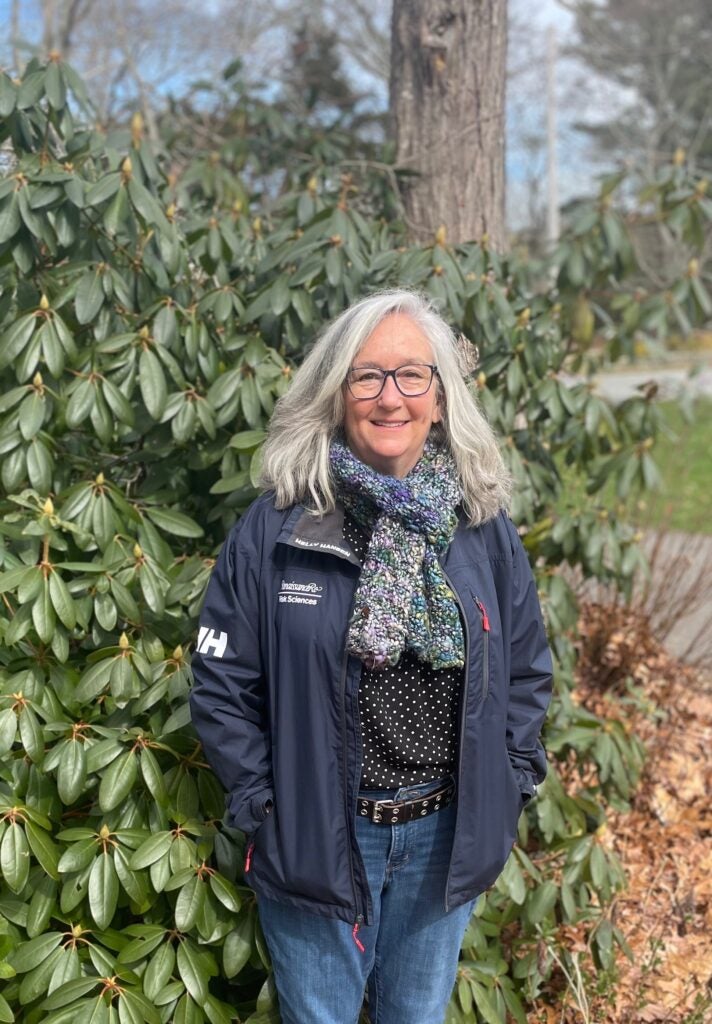April 17, 2024
The University of Rhode Island Office of Innovation in General Education has announced this year’s faculty members who are being recognized for delivering innovative courses as part of the General Education Program.
This year’s highlighted faculty are: Clarisa Carubin, associate teaching professor in the Department of Art and Art History; Elizabeth Mendenhall, associate professor in the Departments of Marine Affairs and Political Science; Liam Malloy, chair and associate professor in the Economics Department; and Kathleen Donohue, professor of oceanography in the Graduate School of Oceanography.
Clarisa Carubin
ART/DSP 404: Data Visualization and Infographic Design, College of Arts and Sciences

Whether you are a nursing, textiles, or sports communication major, the ability to visualize and communicate data and information is an essential skill. In ART/DSP 404: Data Visualization and Infographic Design, Professor Clarisa Carubin introduces the techniques and design principles that enable students to visualize large and complex data, so they can create accurate and compelling visual stories. In this course, Professor Carubin emphasizes the value of learning by doing – engaging students through hands-on experiences in crafting meaningful visuals. Over the course of the semester, students explore the use of print and digital infographics related to issues of sustainability and social justice and create a map of the Kingston campus that highlights the most important places to check out as a student. Collectively, these assignments underscore for students that to tell a meaningful visual story, it must be real, it must be appealing, and it should be inclusive and accessible to everyone. The culminating assignment is the creation of an interactive digital timeline that allows students to apply their design skills to an area of personal curiosity such as the history of Twitter or the development of computer games. In depicting the passage of time, students research the sequence of events, create a mood board of color, text, and graphics for inspiration, and sketch how to arrange information and structure space. Through this learning experience, Professor Carubin hopes her students “come to understand that design is a powerful tool for sharing information in a beautiful, effective, and impactful way.” As a cross-listed capstone, this integrative course aims to highlight for students the intersection between designers and scientists and in doing so, foster in them curiosity and confidence in designing for information.
Elizabeth Mendenhall
MAF 312: International Politics of the Ocean, College of the Environment and Life Sciences

Understanding the purpose of the United Nations Convention on the Law of the Sea is no simple task, but for the students in MAF 312: International Politics of the Ocean, unpacking the issues of this international treaty is an eye-opening exercise that sheds light on the multitude of causes and possible solutions to ocean problems. Professor Elizabeth Mendenhall designed MAF 312 to help students better understand the current state of our oceans –information she believes to be critical to our survival. Careful not to turn her students into pessimists, Professor Mendenhall paints a grim picture of the reality of our declining oceans as a call to action for her students to become informed citizens. With a focus on ocean governance, the course examines the principles, rules, norms, and procedures that regulate human activity in the ocean. While examining how institutions and organizations manage the ocean, students grapple with contemporary problems such as overfishing, piracy, seabed mining, and whaling that expose the competing interests that plague ocean governance. In delivering the information literacy outcome, this course aims to strengthen students’ research skills through in-class activities and a culminating research assignment that center on identifying, annotating, and evaluating current research to answer the ocean questions students are most interested in. Ultimately, the mission of the course is to equip students with the tools that help them to question their world and seek out answers for themselves. It is this agency that helps students to recognize and reflect on their own contribution to ocean problems and solutions. For Professor Mendenhall “it is about student engagement. The unsolicited conversations and perspective taking that happen is the most rewarding part of teaching this course.”
Liam Malloy
ECN 202: Principles of Economics: Macroeconomics, College of Arts and Sciences

Now that the unemployment rate is under 4% again, what is your impression of how easy it is to find work, and do you think it is true for all types of workers in all areas of the country? Do you think most people in the United States feel that they have benefited from the increase in globalization over the last 40-plus years and how do you think you and your family have benefited? These are just two of the prompts Professor Liam Malloy uses to guide students in ECN 202:Principles of Economics: Macroeconomics. A staple of our General Education Program since 2016, this 200-person, large lecture course serves to introduce students to macroeconomics and provide a framework for thinking about economic policies and their impact. Using data from the Federal Reserve, students practice identifying, analyzing, and interpreting data, learning to employ mathematics to construct simple models of the economy. Weekly discussion boards shift attention away from the technical side of the subject matter and allow students to engage with the content as it relates to their personal experiences. Through problem sets, discussion assignments, and exams, Professor Malloy helps students to make sense of real-world economic data, to understand the goals and objectives of fiscal and monetary policies, and to recognize the interconnectivity of spending and income. He explains “spending and income are not separate from each other, so I tell students that if they remember one thing from class in 10 years it should be that one person’s spending is another person’s income.” Professor Malloy endeavors to expand students’ way of thinking about economics and in doing so hopes to encourage civically engaged and informed citizens.
Kathleen Donohue
OCG 200G: Extreme Weather, Graduate School of Oceanography

Professor Kathleen Donohue and Emeritus Professor Brian Heikes designed OCG 200G: Extreme Weather to introduce students to the principles of weather and the far-reaching personal, national, and global influences of extreme weather phenomena. With multiple sections offered every semester, GSO faculty including Professors Tetsu Hara, Isaac Ginis, and Arthur Spivack also teach the course, putting their own spin on the content to include topics like hurricane dynamics and coastal resilience. For example, this semester Professor Spivack has his students interpreting weather maps and using storm tools to detail the impact of flooding in RI to better understand the ocean and climate change. For Professor Donohue, the question of risk is at the forefront when teaching her students about the human impact of weather events. In her class, students tackle current news stories and reflect on the economic, social, and personal impact of weather. In a class of 50+ students, these bi-weekly reports highlight the diversity of student perspectives and the personal connections students have with course content. Using the disaster response game “Are You Ready,” students act out disaster scenarios playing the roles of first responder, federal official, and community member. Working to solve the problem with a set of limited resources, students quickly realize the cascading failure effect that can result from a catastrophic weather event. These hands-on activities demonstrate not only how risk is communicated but also how stakeholders take onus for the consequences of extreme weather. It is Professor Donohue’s hope that her students finish the course “with more gratitude for what is around us. I want students to look up and weather watch more often –to figure out what’s going on and how it impacts their lives because weather is fascinating.”
